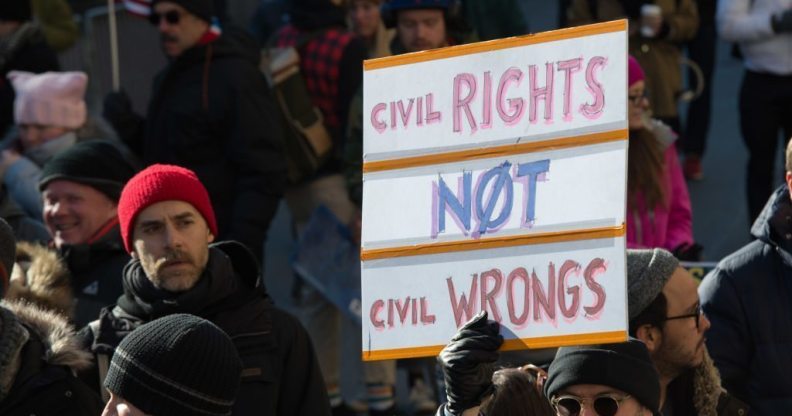Germany is rejecting LGBT asylum seekers who face severe violence if deported

Activists protest against Trump’s “travel ban” (Photo by BRYAN R. SMITH/AFP/Getty Images)
LGBT people seeking asylum in Germany are facing deportation as the Federal Office for Migration and Refugees (BaMF) appears to be failing to acknowledge the severe violence they encounter in their home countries.
A number of LGBT asylum seekers have reported having their applications denied despite fleeing dangerous situations which, if they were to return to, could be potentially deadly.
Speaking to Politico, one trans woman from Lebanon, Eliana, explained how that she had been attacked numerous times for her gender and sexual identity.
Her own brother ordered a group of men to attack her, leaving her with dark bruises and deep cuts all over her body.
Before fleeing Lebanon, she was working as a sex worker but when she arrived in Germany Eliana landed a job at a beauty salon and began to learn German.
She was sure that her application would be accepted because of the horrific treatment she endured in Lebanon, but earlier this year she received a letter informing her of her failed application and the impending deportation.
It was rejected because she crossed the Mediterranean sea from Turkey to Greece presenting as male, which she did in order to protect herself.
“It was humiliating,” she said of the deportation letter. “Everything I had been planning and working on fell apart.”
Gladt, an organisation which supports LGBT asylum seekers, said that they “didn’t expect the decision at all” because her “case was so strong”.
Gladt, as well as other organisations that support LGBT asylum seekers, insist that Germany’s system does not recognise the discrimination that LGBT people face.
“BaMF are making a lot of wrong decisions,” explained Rainbow Refugees founder Knud Wechterstein. “They are sending people back for reasons that don’t reflect the reality in their home country.”
However, BaMF insists that they review each case individually and “if the asylum seeker can credibly show that they would be in danger because of their sexual orientation in their country of origin” then they will be offered asylum.
Wechterstein and other queer refugee organisations argue that BaMF fails to understand the delicacy of LGBT persecution, and what LGBT people may do in order to protect themselves.
Sabrina Latz of the Queer Refugees Network said: “The asylum process needs BaMF to be more sensitive towards the topic of LGBTI persecution and the situation inside different countries.
“Many of our clients are married because they are not able to live openly as gay men in their home countries.”
One man from Iraq, who is gay, married and had children in order to hide his sexuality, just as Eliana presented as male so she was safer when crossing borders.
A Russian couple who fled to Germany were questioned about their sexuality by a judge for four hours, because the judge did not believe that they were gay and in a relationship.
However, it isn’t just Germany that is failing to provide support for LGBT asylum seekers.
In the Belgium city of Antwerp, a gay man from Ghana was deported because he was considered “not gay enough”.
Jurgen Hendrickx’s boyfriend, Festus, was physically forced onto a flight by authorities after a two-year legal struggle.
Jurgen fears that his long-term partner could be killed in his home country of Ghana, where gay people have no rights and face up to three years imprisonment if convicted.
He gave evidence of his life as a gay man in Uganda and Norway and fears that he may be killed if he is deported.
In the UK, gay Afghans who are being deported are being told to “pretend to be straight”.
A document of guidelines outlining the potential risks and laws they could be prosecuted under issued to LGBT people facing deportation.
However, it also insists that the Afghan government has not prosecuted for homosexuality recently, and an LGBT person facing deportation would likely find refuge in the capital of Kabul which does not face the threat of the Taliban.

